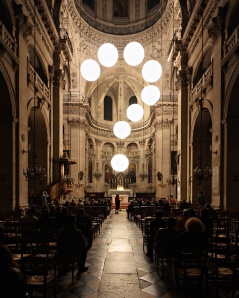One of the phrases I heard quite a bit in the fundamentalist church I grew up in was “You need to check up on your salvation.” It usually followed a long diatribe on sin, or wordliness, or unrighteousness, and the church-cult leader would say it to make sure we all understood that real Christians feel convicted when they hear sin being preached on. Real Christians feel crushing guilt. Real Christians have the Holy Spirit pricking their conscience day in and day out. If we could get through an entire sermon on sin without feeling a single twinge? Well, then, we needed to “check up” on our salvation, because we probably weren’t saved.
Interestingly, and perhaps paradoxically, I got a completely different message about “doubting my salvation.” Real Christians didn’t doubt their salvation, because real Christians could point to a specific time, a specific place, a specific prayer; and any time the Devil assailed them with doubts (and it was always the Devil doing this), a real Christian could point to that moment and say “get thee behind me, Satan!” That moment gave us “assurance of our salvation.” That moment became our testimony.
My first “moment” was when I was five or six. It was around Halloween, and my Sunday school teacher told a horrifying story about druids going from house to house flaying little children alive and burning pieces of their skin inside of pumpkins. He finished his lesson by telling us that Jesus could protect us from the demons if we “asked him to come into our heart.” Terrified, I spent the entire night curled up in my dark bedroom begging Jesus to protect me from the demons I was positive were going to snatch me out of my bed.
Later, when I was around eight, I realized that Christians got baptized, and when I asked to be baptized the lady I spoke to at church asked me when I’d “gotten saved.” Initially I was frustrated because I didn’t know what the heck she was talking about, and it took a few weeks to communicate my confusion to my mother. When I finally understood what “getting saved” meant to a Baptist, I explained to the woman about that night when I asked Jesus to come into my heart to save me from the demons. She wasn’t entirely convinced by that story, so she led me through a “sinner’s prayer.”
When I was eleven, I was in a revival service listening to an evangelist describe the horror of the crucifixion. The next night he preached a message about the difference between “profession and possession.” He explained how people can walk around saying they’re a Christian but who aren’t “saved” at all. In a sudden burst I realized that I had never really “gotten saved,” so I decided I’d go down to the altar at the end– but wait, what if the Rapture happened before the end of the service? I’d be “given over to a reprobate mind” for not getting saved before the Rapture and go to hell!
So, I walked myself through the Roman’s Road and prayed another sinner’s prayer in the middle of the sermon.
Those were my moments. Those were the times I could point to and declare, definitively, that I was saved. I didn’t have to worry about “doubting my salvation.” I had a rock-solid testimony. Any time I felt conflicted, or unsure, or afraid of hell, I could point to that moment and tell myself there was nothing to worry about.
~~~~~~~~~~
There are moments when I wish for the simplicity of my childhood. When I long for the comfortable black-and-white of saved and not saved— it was so quantifiable, so objective. Saved people had repented of their sin and asked Jesus to save them during a sinner’s prayer. Unsaved people had never done that. It was simple. Easy.
Now, though, that things have become far more complicated and far more gray, I find myself struggling again and again with questions.
Is God real?
Does he love me?
Was Jesus God?
What is Election?
What does the Atonement mean?
Does God send people to hell for no other reason than they’d never heard of Jesus?
Do I want to be a Christian anymore if the answer to that is yes?
And, when I’m asking these questions, you better check up on your salvation comes flitting through my head, unbidden and unwanted. I wish I could banish that phrase from my memory. I wish I’d never heard it once– let alone the countless times it was screamed at me. I wish I could get rid of it, because it makes these questions so much harder. There is a part of me– and sometimes this part of me is big, sometimes it is small– that wonders if I could possibly be a real Christian if I am plagued by these sorts of doubts. How can I call myself a Christian if I’m putting myself into the position of “judging God by human standards”? How can I call myself a Christian if I doubt his existence– or, if not his existence, then if he cares about human reality at all?
How can I be a Christian and doubt?
I know, most of the time, that doubt isn’t the antithesis of Christianity or faith. I know having serious questions about my religion doesn’t disqualify me from embracing it. But, I’m still, sometimes, terrified of being sent to hell– eternal conscious torment– for my unbelief. Somehow strangely sure that not feeling constant nagging guilt means that I can’t be a real Christian. That my new-found comfort of dwelling in the gray means that I no longer “know whom I have believed, and am persuaded that he is able to keep that which I have committed unto him against that day.” I am comfortable questions, with perhaps never knowing what it means to be “saved” or “one of the Elect” and that must mean that I’m not. Because surely real Christians know that.
There is still a little girl inside of me curled up on her bed begging Jesus to protect her from the demons.













